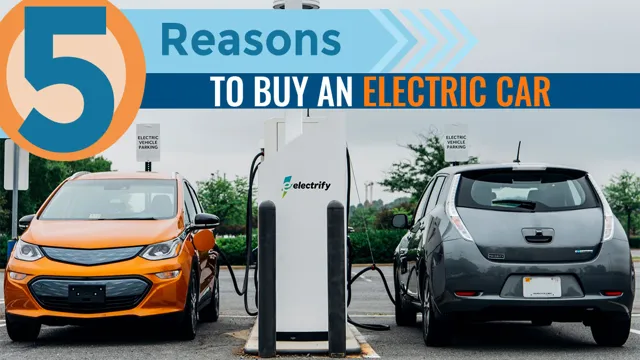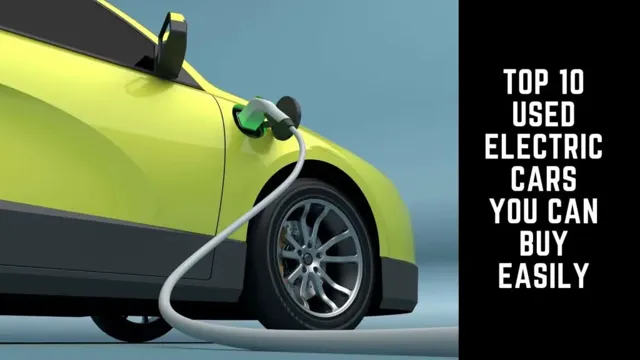Electrify Your Impact: How Electric Cars are Saving the Planet
Electric cars have evolved dramatically over the past decade, and as a result, they have become an increasingly popular form of transportation. However, not everyone understands the benefits that electric cars can have on the planet and our future. In this blog, we will explore the relationship between electric cars and the planet.
How do electric cars impact our environment and climate change? What are the benefits of electric cars for our planet and society? Ultimately, we will explore why electric cars are a crucial part of our future.
Reducing Emissions
Electric cars are good for the planet because they greatly reduce emissions. Unlike traditional gasoline-powered vehicles, which emit large amounts of carbon dioxide and other harmful pollutants that contribute to climate change and air pollution, electric cars run on electricity stored in rechargeable batteries. This means they produce significantly fewer emissions throughout their lifetime, helping to preserve the earth’s natural resources and reduce our impact on the environment.
Electric cars are also more energy-efficient than traditional cars, meaning they use less energy to travel the same distance. This not only reduces emissions but also helps to reduce our dependence on fossil fuels, which are a finite resource that is becoming increasingly scarce. Overall, electric cars are an excellent choice for anyone looking to reduce their carbon footprint and make a positive impact on the planet.
Compared to Gasoline Cars
Reducing Emissions Compared to gasoline cars, electric cars have much lower emissions, making them an environmentally-friendly option. The traditional internal combustion engine in gasoline cars produces harmful greenhouse gases, such as carbon dioxide, which contribute to climate change. On the other hand, electric cars are powered by electricity stored in powerful batteries, which do not produce any emissions.
Furthermore, EVs are not only great for reducing emissions while driving, but also have a significantly lower CO2 footprint during the manufacturing process when compared to gasoline cars. Overall, electric cars can make a huge difference in reducing emissions and minimizing our environmental footprint. By switching to an electric car, we take a big step towards a cleaner, greener future for ourselves and future generations.

Less Greenhouse Gases
Reducing emissions is crucial to combat the impacts of climate change. One of the biggest contributors to greenhouse gas emissions is the burning of fossil fuels, which release large amounts of carbon dioxide into the atmosphere. But reducing emissions is not just about moving away from fossil fuels; it’s also about finding ways to be more efficient and sustainable in our daily lives.
This can be done by making simple changes, such as using energy-efficient appliances, driving less or using public transport, and choosing to purchase products made from sustainable materials. By taking these small steps, we can all play a role in reducing emissions and protecting our planet. Imagine each of these small steps as a drop of water, slowly forming a river that flows towards a cleaner and greener world.
Cleaner Air
Electric cars are good for the planet for a variety of reasons, with one of the primary benefits being cleaner air. Traditional gas-powered vehicles emit harmful pollutants that can have a serious impact on public health and the environment. Electric cars, on the other hand, produce very little emissions and help to reduce air pollution levels.
This is especially important in areas with high traffic volume and urban areas where air pollution can be particularly harmful. So, why are electric cars good for the planet? They contribute to cleaner air, which benefits not only our health but also the health of the planet. By transitioning to electric cars, we can reduce our carbon footprint and help create a more sustainable future for generations to come.
Improved Air Quality
Improved air quality is a crucial issue that affects everyone. It is well known that clean air is vital for maintaining good health and well-being. Thanks to various measures and initiatives taken by governments and private organizations, air pollution has seen a significant reduction in recent years.
Cleaner air has many benefits, from fewer respiratory illnesses to a decrease in greenhouse gas emissions. The installation of efficient air filters and the use of renewable energy sources have significantly contributed to this positive change. With improved air quality, people can now enjoy outdoor activities without the fear of harmful pollutants in the air.
It is our responsibility as individuals to do our part in preserving the environment for generations to come. Let us continue to strive towards achieving cleaner air and a healthier future.
Global Health Benefits
Cleaner air has numerous benefits for global health. First and foremost, cleaner air reduces the risk of respiratory illnesses, such as asthma and chronic obstructive pulmonary disease (COPD). This is because air pollution can irritate the lungs and cause inflammation, leading to breathing difficulties.
Additionally, cleaner air can also decrease the risk of heart disease and stroke, as studies have shown that exposure to air pollution can increase blood pressure and damage blood vessels. Moreover, cleaner air can help to mitigate climate change, which has numerous health impacts such as heatwaves, extreme weather events and the spread of infectious diseases. Governments and communities can work together to reduce air pollution by implementing policies and practices that prioritize clean energy, use of public transport, and encourage sustainable living, among others.
By doing so, we can enjoy the health benefits that come with cleaner air and create a healthier future for ourselves and our planet.
Renewable Energy
Electric cars are good for the planet because they reduce greenhouse gas emissions and pollutants that harm the environment. Conventional cars emit carbon dioxide, nitrogen oxides, and other harmful gases that contribute to climate change. On the other hand, electric cars operate without producing any emissions and are powered by renewable energy sources such as wind and solar power, that are sustainable and clean.
Moreover, the batteries used in electric cars are recyclable and not as toxic as those in conventional cars. By investing in and adopting electric cars, we can minimize our carbon footprint and contribute to the fight against climate change. The switch to electric cars is a step towards a more sustainable future where we can enjoy clean air and sustainable transportation while preserving the planet for future generations.
Powered by Wind and Solar
Renewable Energy Renewable energy, specifically wind and solar, provides an eco-friendly alternative to traditional power sources. Wind turbines and solar panels are becoming more commonly employed to generate electricity as the demand for sustainable sources continues to grow. The power generated from wind and solar sources can be stored and distributed, making it reliable and increasingly cost-effective.
Additionally, renewable energy is a boon to the environment, reducing our reliance on fossil fuels and drastically cutting down on carbon emissions. Switching to renewables not only helps the planet, but also creates job openings and supports local economies. By embracing renewable energy, we can ensure a brighter future without compromising our planet’s health.
Reducing Fossil Fuel Use
Renewable energy is becoming an increasingly popular solution for reducing our dependency on fossil fuels. Using sources such as wind, solar, hydropower, and geothermal power, renewable energy sources offer clean, sustainable ways to generate electricity. Unlike coal and oil, which emit harmful greenhouse gases into the atmosphere, renewable energy sources produce little to no carbon emissions, making them an eco-friendly alternative.
While renewable energy technologies have been around for some time, recent advancements in technology have made them more efficient and cost-effective than ever before. As we continue to prioritize sustainable practices, transitioning to renewable energy sources will play a crucial role in reducing our carbon footprint and keeping our planet healthy for generations to come.
Energy Efficiency
Electric cars are good for the planet because they are energy-efficient and environmentally friendly. Unlike gasoline-powered cars, electric vehicles do not release harmful pollutants into the air, making them a much cleaner alternative. Electric cars also use regenerative braking systems, which capture energy that would otherwise be wasted during braking and convert it into electrical energy.
This means that they are much more energy-efficient than traditional cars, allowing them to travel longer distances on a single charge. In addition, electric cars can be charged using renewable energy sources such as solar or wind power, further reducing their environmental impact. Overall, choosing an electric car over a gasoline-powered one is a smart move for both the planet and your wallet.
Conclusion
In summary, electric cars are a win-win for both the Earth and its inhabitants. Not only do they reduce harmful emissions and combat climate change, but they also offer a smoother, more efficient driving experience. Plus, with ever-improving technology and expanding charging infrastructure, it’s becoming easier than ever to make the switch from gas to electric.
So why drive a gas-guzzler when you can help save the planet one charge at a time?”
FAQs
What makes electric cars better for the environment than gas-powered cars?
Electric cars produce zero emissions, while gas-powered cars produce harmful pollutants that contribute to air pollution and climate change.
How do electric cars help reduce our dependency on fossil fuels?
Electric cars run on electricity, which can come from a variety of sources including renewable energy sources like solar and wind power. This helps reduce our dependence on fossil fuels like oil and gas.
Are there any financial incentives for purchasing an electric car?
Yes, there are various financial incentives available including tax credits and rebates from both the federal and state governments, as well as potential savings on fuel and maintenance costs.
Can electric cars really help mitigate the negative effects of climate change?
Yes, electric cars are just one piece of the puzzle in reducing our carbon emissions and mitigating the impacts of climate change. By switching to cleaner modes of transportation, we can collectively reduce our carbon footprint and move towards a more sustainable future.




